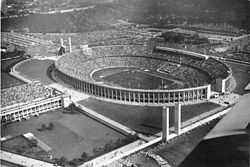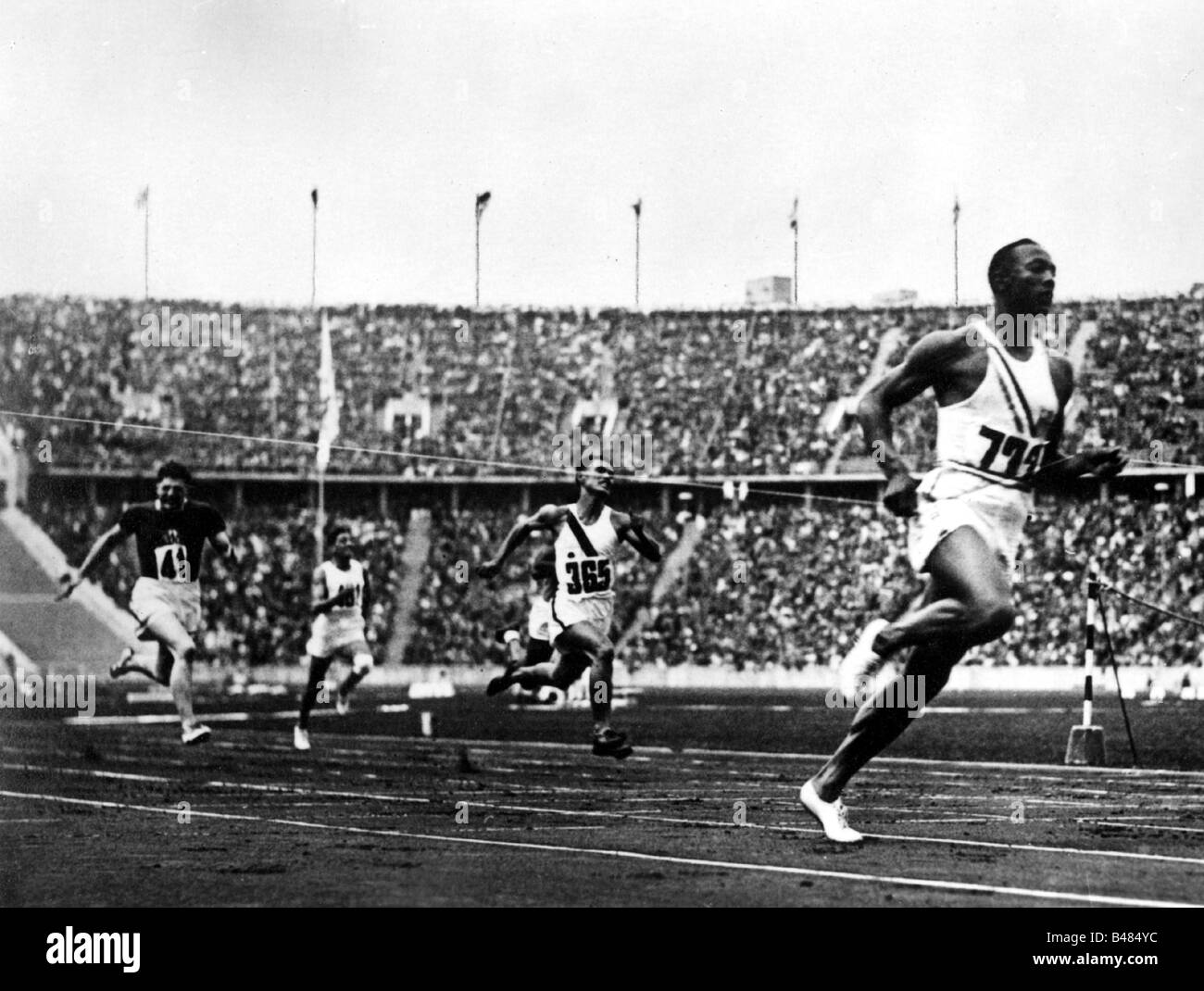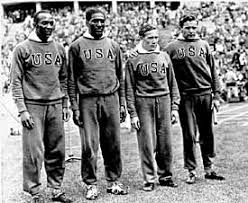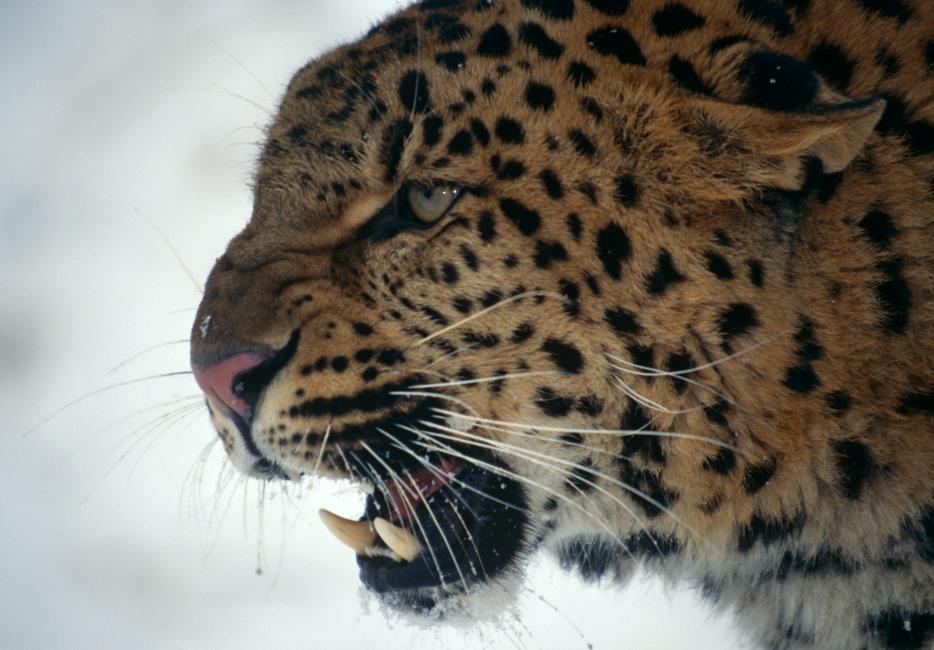Ana Martín portfolio
Ana Martin Porfolio(Villamayor)
THE OLYMPIC GAMES OF BERLIN 1936
The Olympic Games of Berlin 1936
🚴
● Berlin 1936 Olympic Games, athletic festival held in Berlin that took place August 1–16, 1936. The Berlin Games were the 10th occurrence of the modern Olympic Games. The 1936 Olympics were held in a tense, politically charged atmosphere.
● The 1936 Berlin Olympics, officially known as the Games of the 11th Olympiad, took place in Berlin, Germany, during the period of the Third Reich. 3963 athletes (3632 men and 331 women) from 49 countries participated, who competed in 19 sports and 129 specialties. The most prominent athlete was the American athlete Jesse Owens.

Olympic torch:
Boxing | Cycling | Horse riding | Fencing | Football | Gymnastics | Weightlifting | Hockey | Fight | Swimming | Modern pentathlon | Canoeing | Polo | Rowing | Swimming jumps | Shot | Candle | Water polo.



What happened at the 1936 Berlin Olympics?
Also, in the summer of 1936: John Youie "Long John" Woodruff (July 5, 1915 – October 30, 2007) was an American middle-distance runner, winner of the 800 m event at the 1936 Summer Olympics.


Obverse of John Woodruff's gold medal for winning the 800 metres.
Anthem ( clik on it)
This was the anthem that accredits the 1936 Olympics.
🚴
● Berlin 1936 Olympic Games, athletic festival held in Berlin that took place August 1–16, 1936. The Berlin Games were the 10th occurrence of the modern Olympic Games. The 1936 Olympics were held in a tense, politically charged atmosphere.
● The 1936 Berlin Olympics, officially known as the Games of the 11th Olympiad, took place in Berlin, Germany, during the period of the Third Reich. 3963 athletes (3632 men and 331 women) from 49 countries participated, who competed in 19 sports and 129 specialties. The most prominent athlete was the American athlete Jesse Owens.

Olympic torch:
● Olympiad was the first in which a relay race was held to bring the Olympic fire from Greece to the site of the games. The idea came from Carl Diem (head of the organizing committee) because he saw the Third Reich as a continuation of the Holy Roman Empire, which in turn was seen as a continuation of the Roman Empire, which was seen as a cultural continuation of the ancient Greeks .
From July 20 to August 1, 3422 relievers took the Olympic torch on a route of 3422 kilometers whose route was (roughly) as follows:
Greece: Olympia, Athens, Thessaloniki.
Bulgaria: Sofia
Yugoslavia: Belgrade
Hungary: Budapest
Austria: Vienna
Czechoslovakia: Prague
Germany: Dresden, Berlin.
A secondary relay took the Olympic flame to Kiel.
Sports
| Sports in the Olympic Games of Berlin 1936 | |
Athletics | Basketball | Handball a eleven | | |

JESSE OWENS:
James Cleveland «Jesse» Owens (Oakville, Alabama, United States, September 12, 1913-Tucson, Arizona, United States, March 31, 1980) was an American athlete. At the 1936 Olympic Games in Berlin he gained international fame by winning four gold medals in the 100m, 200m, long jump and 4 × 100m relay races.
At its height, he was considered "the best and most recognized athlete in history." One of his most important achievements was the achievement of three world records, and to equal another absolute mark during the Big Ten Conference competition in 1935 .
The Jesse Owens Award is the most significant recognition of USA Track and Field for the best track and field athlete of the year.

Personal information
Full name: James Cleveland Owens
Birth: Oakville, Alabama, United States
September 12, 1913
Nationality: Flag of the United States of America
Death: Tucson Arizona United States March 31, 1980 (66 years old)
Height: 1.80 meters (6 feet) 1
Weight:165 pounds (75 kg)
Couple: Minnie Ruth Solomon
Career
Sport: Athletics
University of Ohio University Team
Specialty: Speed racing
long jump
What happened at the 1936 Berlin Olympics?
For two weeks in August 1936, the Nazi dictatorship of Adolf Hitler camouflaged its racist and militaristic character while it hosted the Summer Olympics. ... In 1931, the International Olympic Committee chose Berlin as the venue for the Summer Olympics of 1936.
Participating countries (in blue, debutantes).
The following countries participated in the games:
Afghanistan, Nazi Germany, Argentina, Australia, Austria, Belgium, Bermuda, Bolivia, Brazil, Bulgaria, Canada, Czechoslovakia, Chile, China, Colombia, Costa Rica, Denmark, Egypt, United States, Estonia, Philippines, Finland, France, Greece , Hungary, Iceland, India, Italy, Japan, Latvia, Liechtenstein, Luxembourg, Malta, Mexico, Monaco, Norway, New Zealand, Netherlands, Peru, Poland, Portugal, United Kingdom, Romania, South Africa, Sweden, Switzerland, Turkey, Uruguay and Yugoslavia.
Spain did not participate, since the government of the Second Spanish Republic was organizing in Barcelona a parallel Olympics in order not to give wings to fascism and to boycott Hitler's Germany. In this Popular Olympiad more athletes were going to participate than in the official ones, but they never got to celebrate because the day before its start, between July 17 and 19, 1936, there was a coup d'état against the government of the Republic, which would lead to the Spanish Civil War.
Events
129 events in 25 disciplines, comprising 19 sports, were part of the Olympic program in 1936. The number of events in each discipline is noted in parentheses.
- Aquatics
 Diving (4)
Diving (4) Swimming (11)
Swimming (11) Water polo (1)
Water polo (1)
 Athletics (29)
Athletics (29) Basketball (1)
Basketball (1) Boxing (8)
Boxing (8) Canoeing (9)
Canoeing (9) Cycling
Cycling- Road (2)
- Track (4)
 Equestrian
Equestrian- Dressage (2)
- Eventing (2)
- Show jumping (2)
 Fencing (7)
Fencing (7) Field hockey (1)
Field hockey (1) Football (1)
Football (1) Gymnastics (9)
Gymnastics (9) Handball (1)
Handball (1) Modern pentathlon (1)
Modern pentathlon (1) Polo (1)
Polo (1) Rowing (7)
Rowing (7) Sailing (4)
Sailing (4) Shooting (3)
Shooting (3) Weightlifting (5)
Weightlifting (5) Wrestling
Wrestling- Freestyle (7)
- Greco-Roman (7)
Basketball and handball made their debut at the Olympics, both as outdoor sports. Handball did not appear again on the program until the next German summer Olympic games in Munich in 1972. Demonstration sports were Art, Baseball, Gliding and Wushu.
Also, in the summer of 1936: John Youie "Long John" Woodruff (July 5, 1915 – October 30, 2007) was an American middle-distance runner, winner of the 800 m event at the 1936 Summer Olympics.


Obverse of John Woodruff's gold medal for winning the 800 metres.
Anthem ( clik on it)
This was the anthem that accredits the 1936 Olympics.
SELF-ASSESSMENT (SECOND TERM)
SELF-ASSESSMENT ( SECOND TERM) 🎶 📄
1- WHAT CAN I DO THAT I COULDN'T DO BEFORE?
Now I can know about: Principles os formal composition repetition and contrast.
2- WHAT DO I LIKE MOST?
Play the recorder.
3- WHAT DO I DO WELL?
I'm good at rhythms and playing the flute.
4- WHAT AM I CONFUSED ABOUT?
I think I'm not good at some definitions of: Simple forms.
5- WHAT DO I NEED HELP WITH?
I need help in musical language
6- WHAT DO I DO IN ENGLISH AND/OR MUSIC OUTSIDE THE CLASS?
I go to English classes, math and Zumba clases
7- WHAT DO I NEED TO IMPROVE?
7- WHAT DO I NEED TO IMPROVE?
I need to improve the musical language.
8- WHAT DID I LEARN ABOUT CULTURE?
Some musical instruments that are played around the world.
VOCABULARY III
🎜🎝VOCABULARY III 🎵
Genre: género.
Folk music: música folclórica.
World music: músicas del mundo.
Popular music: música popular.
Vinyl record: disco de vinilo.
Sacred music: música sacra.
Dance music: música de danza.
Soundtrack: banda sonora.
Choreography: coreografía.
Ballet: ballet.
Stage: escenario.
Improvisation: improvisación.
Flamenco: flamenco.
Synthesizer: sintetizador.
Middle Ages: Edad Media.
Renaissance: Renacimiento.
Baroque: Barroco.
Classicism: Clasicismo.
Romanticism: Romanticismo.
Impressionism: Impresionismo.
Twentieth Century Music: Música del Siglo XX.
Triplet: tresillo.
Anacrusis note: nota anacrúsica.
Fret: traste.
Gregorian chant: canto gregoriano.
Opera: ópera.
Program music: música programática.
Gothic Rock: Rock Gótico.
New Wave: "nueva ola".
Symphony: sinfonía.
Mass: misa.
Consonance: consonancia.
Dissonance: disonancia.
Theme: tema musical (principal).
Stress: acento.
Reed: lengüeta.
Polyphony: polifonía.
Folk music: música folclórica.
World music: músicas del mundo.
Popular music: música popular.
Vinyl record: disco de vinilo.
Sacred music: música sacra.
Dance music: música de danza.
Soundtrack: banda sonora.
Choreography: coreografía.
Ballet: ballet.
Stage: escenario.
Improvisation: improvisación.
Flamenco: flamenco.
Synthesizer: sintetizador.
Middle Ages: Edad Media.
Renaissance: Renacimiento.
Baroque: Barroco.
Classicism: Clasicismo.
Romanticism: Romanticismo.
Impressionism: Impresionismo.
Twentieth Century Music: Música del Siglo XX.
Triplet: tresillo.
Anacrusis note: nota anacrúsica.
Fret: traste.
Gregorian chant: canto gregoriano.
Opera: ópera.
Program music: música programática.
Gothic Rock: Rock Gótico.
New Wave: "nueva ola".
Symphony: sinfonía.
Mass: misa.
Consonance: consonancia.
Dissonance: disonancia.
Theme: tema musical (principal).
Stress: acento.
Reed: lengüeta.
Polyphony: polifonía.
Subscribe to:
Comments (Atom)
-
The Olympic Games of Berlin 1936 🚴 ● Berlin 1936 Olympic Games, athletic festival held in Berlin that took place August 1–16, 1936. Th...
-
PROJECT III PROGRESSIVE ROCK

